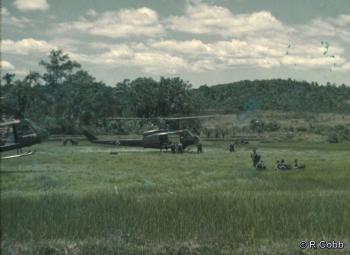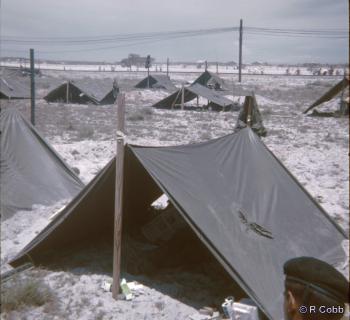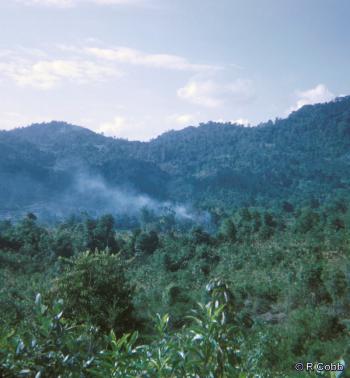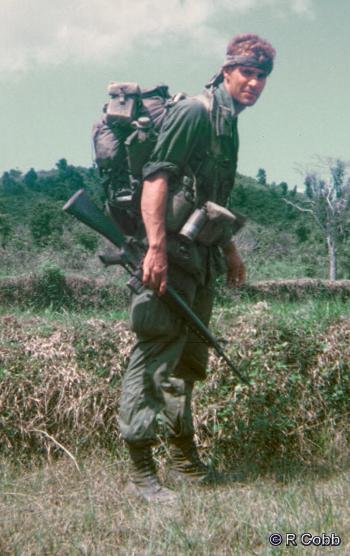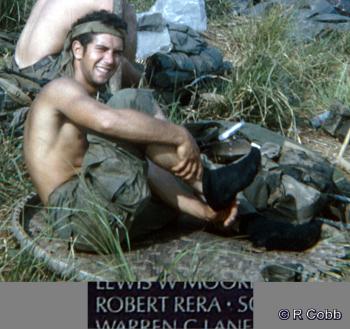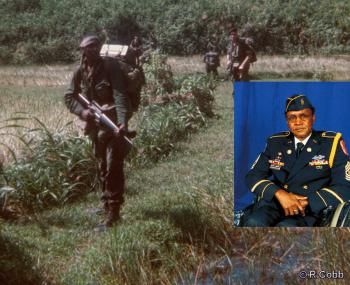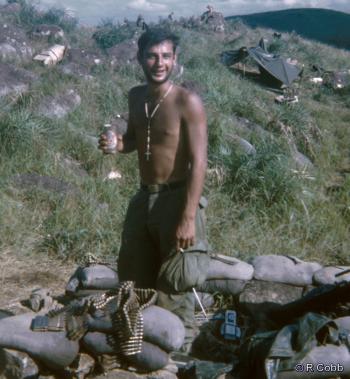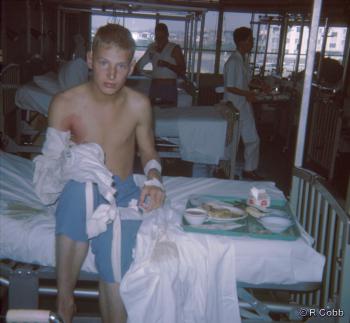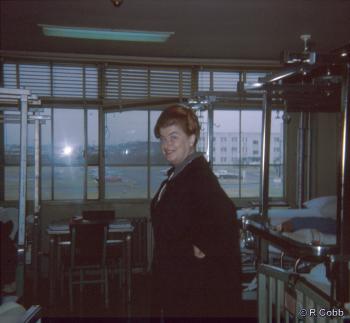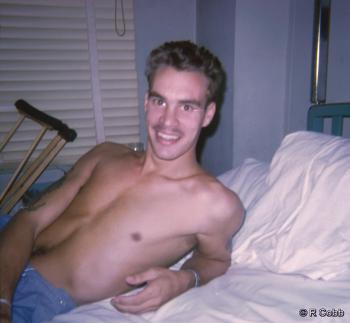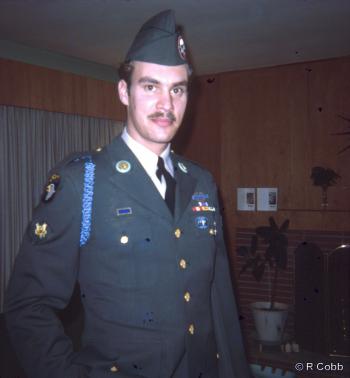50 Years ago - A sudden end to my time in Vietnam
~ Thursday, October 26, 2017 ~
(Oct 26, 2017) Fifty years ago today, October 26, 1967, my time in the boonies of Vietnam came to a sudden end.
I don’t remember feeling anything other than the sensation that a gray wall had hit and surrounded me, followed by a sensation of flying. There was no sound. It was the first time I learned that a sudden violent death would be painless – you only feel pain if you survive. Three of us were put on the Medevac chopper out of the boonies on that day.
I had been fresh out of high school and bored with a mundane job. There was some news and a few songs about some war somewhere. Sounded like an adventure, and more interesting than what I was doing. I enlisted in the Army in December 1965, signed up for Airborne (paratrooper) training, and volunteered for Vietnam. I arrived in June 1966, assigned to the 101st Airborne Division.
When I arrived at the Screaming Eagle base camp for processing, my name was called and I was told I was going to be an MP(!) WTF? I had trained and volunteered as infantry. Tough luck kid, you’re an MP now. That was not acceptable. I had hung out with the Bad Boys in high school, and many of my friends from then ended up doing things like joining the Pagans Motorcycle Club, or just getting in trouble and arrested on their own – the last thing I wanted to do was be a cop!!
But an MP I became, much as I hated it. I did take pride that in 10 months I never wrote a single citation. At least some of the duty was going out in a gun jeep to accompany the engineers on their morning mine sweeps on the roads outside of town, and that was closer to what I had signed on for.
They had a deal where you could extend your time in Vietnam (but not the Army) by six months, and get an extra 30 days leave you could take anywhere in the world. You would almost certainly get your choice of assignment as well. I extended for the Recondo platoon of the 2nd Battalion of the 502nd Infantry Regiment (mostly referred to over there simply as the “O Deuce”), which was part of the 101st. That did the trick.
One afternoon towards the end of May, 1967, I was preparing to go on MP duty when the Sarge walked into the tent and told me that someone else would take my duty - I was now assigned to the Recondos. They were short and needed people immediately, and the paperwork would get dealt with later. Get on over to the 2/502 area - a supply helicopter would take me out to the Boonies to join the Recondos in an hour!!
I threw all my belongings into a duffel bag and rushed over to the 2/502 Headquarters area. They started throwing gear at me - rucksack, M-16, grenades, C-rations, ammunition, canteens - all the while telling me to hurry up - the chopper was idling on the pad waiting for me. I was stuffing gear into the ruck sack, my pockets, anywhere it would fit - Hurry Up Kid!
Finally I had all my gear packed or hanging off of me and I tried to put the ruck sack on and get up. I couldn’t budge it! OK, now I know what’s going on - they’re messing with the New Guy - trying to make him think he’s got to carry all this stuff. Good joke guys, now what am I really supposed to be taking with me? Dumb Ass!! Get on that chopper - we don’t have all day to wait for your lame ass! Oh my God - I really am supposed to carry all this stuff!! I used my rifle and a tent pole to help me get to my feet, and then staggered to the chopper with the 100 lb plus load.
No sooner was I in the chopper than it lifted off, before I had even a chance to sit down or get myself to what I felt was a secure position. I don’t remember the ride at all - just the slowly but surely dawning realization that .. I .. really .. was .. about .. to .. be .. in .. the .. Recondos. Was this reaaalllly what I wanted to do? Mostly I was just shocked, surprised, and very very intimidated.
The chopper landed in a temporary LZ as the last supply chopper of the day, just as dusk was starting to fall. Everyone grabbed supplies off the chopper then we immediately moved out to get to a night time position.
“Hi, I’m …” SSSHHHHH! Dumb Ass Cherry - Shut UP! Don’t you know anything about noise discipline!?!?
And that was my Welcome to the Recondos.
From the O Deuce web site ( http://2nd502.org ) description of our operations in Vietnam:
“The historical average ‘time in combat’ for WWII Infantry Soldiers was 40 days, and in Vietnam they give 240 days as the norm or average. In the O Deuce the norm was much closer to 330 days - in a 365 day tour. We lived ‘in the bush’, and saw the rear area for only a couple of days at a time, often a month or more apart.“
About every second or third day we would secure a hilltop or other area to use as an LZ, and helicopters would bring us fresh food and ammunition, mail, a hot meal, and other supplies. We had only the single set of jungle fatigues we wore, and when we wore them out they’d give us a new set. That usually only took a couple of weeks. Freshly supplied with C-rations (in cans), rifle and machine gun ammunition, grenades, claymores, C-4, trip flares, and lots of water, the average load would go above 100 lbs. Some, like the medics and radio operators, carried even heavier loads.
Between supply days we lived quietly in the jungle, “humping the boonies” all day up and down mountains, then pulling guard duty at night in 3 man positions (1 hr on, 2 off). You never had enough sleep, and could sleep anywhere, anytime if given the chance. Every few weeks you’d get two or three days back in the forward base camp. Those times were devoted to sleep and drunken trips to the local town. When the infantry came in out of the bush, in dirty and torn fatigues, smelling bad, and with a hell of an attitude, the rear echelon folks mostly just stayed out of our way. They knew that in a couple of days we would be back on the choppers with monumental hangovers, heading back to the bush, and things would quiet down again.
Between the time I joined the Recondos and left the boonies for good was about 5 months. I was fortunate that the worst of what the war had to offer somehow passed me by, although at times only narrowly. When we went to relieve another company of the O Deuce after they had been decimated the night before, it was only a short walk from where we had spent the night. When I took my leave that was granted for the extension, I returned to find few familiar faces. While I had been back in the US my Recondo platoon had walked into a large ambush that only a few escaped from without at least being wounded.
Even though I never saw the worst of it, I did see men die – both ours and theirs. Some things I have been proud to have experienced and shared with my Vietnam Brothers, others not so much so. No matter how you look at it, war is an ugly business. You see both the best and the worst of what people can be. What made this war worse is that it was never clear who was friend and who was enemy.
But the greatest part of our time was spent in tedium – humping up this mountain and down that one, wading through rice paddies or cutting our way through dense growth – continuously hunted by mosquitoes and leeches, or being soaked by rain that sometimes seemed it would never stop. Some nights we would be setting up our guard positions and see ourselves surrounded by leeches on the vegetation. They sensed our presence and in every direction you’d see them inching their way towards you. Time to tuck pants legs securely into boots, roll down sleeves, and pull out the insect repellent. Rain during the day was miserable enough, but even worse at night. The total of our sleeping gear was a poncho and a very thin quilted thing called a poncho liner. Vietnam may be a hot place, but sleeping soaked on a hillside with water flowing under and around you was shiveringly cold.
Some of our losses just seemed a complete waste. A well respected squad leader was walking down a slight hill on a resupply day, talking to one of my good friends. Because of the slope, the blade from the helicopter further down the hill hit his head. My buddy said he dropped like a sack of potatoes in mid-sentence. He didn’t die immediately, but because of the nature of the injury, everyone considered it a blessing when the news came back that he had died later. During a thunderstorm, one of our radio operators was killed by a lighting strike on his antenna.
I believe my most terrifying night came after we found an NVA training camp late in the day. We captured an officer and some maps and other papers, but most of the NVA slipped away before we could get them. We set up a position down the hill from the camp (which was on a hill top). Several other guys and I were in a “forward listening post” - up the steep hill from the rest of the Recondos. The only piece of ground flat enough to set up a position on had a tunnel opening next to it. It was a long and tense night – waiting for someone to pop up out of that hole – and unknown things rolling down the hill towards us. Rocks? Grenades? Could the steep hillside be that unstable, or was someone trying to get us to fire to reveal our positions? Fortunately none of those things came to pass, and I don’t know that I have ever been so glad to see the first light of dawn appearing.
My last day was mostly taken up doing Search and Destroy.
We were in an area that we were told was sympathetic to the VC, and our mission was to eliminate support. Rice was destroyed, houses searched for weapons and burned. About the middle of the day we took sniper fire from a nearby ridge top. Rather than go after the sniper, we sheltered behind rocks and trees, took a break, and called in artillery on the ridge. That quieted things down and we continued on our mission.
That evening we went up on the ridge to set up our night position. The ridge was undulating, with little peaks every 100 yards or so. It was still a few hours before dark, and we started setting up our positions around one of the small peaks. We had just started digging into our rucks when the word came to move to the next knob. Grumble grumble – typical military. On the next knob we again started getting settled in. Then word came down, one more move! By this time we were pretty fed up, and in our irritation we probably weren’t paying as much attention as we should have.
I had three positions/jobs I normally walked, Point, Slack, and sometimes machine gun. Point man is the first guy in line, and he picks the trail and is the group’s eyes at the front. Slack man walks behind Point, and they work as a team. If, coming into a clearing, the Point man looks left, then the Slack man looks right. The job is basically to “take up the slack” for Point. I probably spent the greatest part of my time in the Slack position, as I was that evening. Bob Rera was on Point, and Eric Sanders, the RTO (radio) guy was behind me.
The ridge was mostly covered in low brush. You could see over most of it, but it was hard to walk through it without having it rubbing against you. Apparently the trip wire was not visible to Bob, at least in our annoyance, and he probably would not have felt it with all the other brush rubbing against him. We later determined it was probably an American grenade with the normal 5 second fuse delay. Bob hit the trip wire and kept going. Apparently I had just passed it by a couple of feet when it went off.
After being enveloped by the silent gray wall and the flying feeling, I found myself laying on the ground. Purple smoke was billowing everywhere. I realized that a smoke grenade I had been carrying on the outside of my gear had been set off. I began to realize that the burning smoke grenade was attached to a belt with real grenades and live ammo, and it was time to get it away from me. Whether or not I actually stood I can’t recall, but I did get upright enough to fling the belt away before falling back and yelling “Medic”.
“Doc” Rizzi got to me very quickly, and after looking me over gave me a shot of morphine. I found out that three of us had been hit – Bob, the Point man, and Eric, the RTO. Eric wasn’t noticed immediately. He had been blown off to the side of the trail into some brush, and some shrapnel had gone through his throat, so he couldn’t talk. It wasn’t until somebody wanted his radio that they realized he was missing, after which he was found. But there was a several minute delay in treatment for which Doc (who is a good friend to this day) still beats himself up over.
It was still daylight and clear, and the Medevac helicopter was there in a short time to take the three of us out of the field. I heard sometime afterwards that someone had been shooting at our chopper as we were flying out.
Back in the triage area of the field hospital (big tents) some high ranking officers came to visit us and gave us cigarettes and attaboys. Except for Eric – last I saw of him they were doing something to his throat like a tracheotomy before hurriedly wheeling him away. I shortly followed him into surgery and awoke late at night with bandages all over me, and a bad case of diarrhea. I yelled for the orderly to get me a bed pan quick. He moved with great speed, telling me to Hold It! - but he was too late. That was a miserable experience for both of us.
I think I remained in country for only another day before I was flown to a hospital in the Phillipines where I spent a night, then continued on to Japan to the hospital in Camp Zama. It was a special transport plane with nothing but rows of racks for stretchers stacked perhaps 3 or 4 high. I spent about a month in Japan before coming back to the US.
Back on the ridge the rest of the guys were trying to get the guy that had been shooting at our helicopter, and getting ready for the night. Another good friend that I kept up with afterwards told me that he had walking along the ridge when a friend of his grabbed him and yanked him violently backwards. What the Hell? His friend just pointed. Then he saw the tripwire that he had been just inches from hitting. That one was disarmed before it could get anyone else, and it was probably identical to the one that got us – American grenade with the pin nearly pulled, attached to a trip wire. They realized that the sniper fire earlier in the day had likely been a ploy to get us to come up and chase him – and run into those booby traps. That hadn’t worked, but then we’d stumbled into them later on anyway.
Bob had only gotten a few pieces of shrapnel in his butt, and he was soon out in the boonies again. He was KIA in a firefight four months later. My right leg had gotten most of the damage, although my right shoulder, left leg and chest caught some shrapnel too. One of the bones in my right ankle was broken, and there was a big hole in the back of my thigh. Looking at a photo taken of me just days before the injury, I can see that I had shrapnel in just about every part of my body that had not been shielded by equipment or the angle of the blast. They told me my rucksack had been totally shredded and destroyed, but it had protected me from the worst of the blast. One bit of grim satisfaction from that was that apparently several cans of the C-rations knows as Ham and MF’s (the MF’s were Lima beans - yes they were that bad) had been completely shredded.
Arriving on the ward in Camp Zama I realized how well off I was compared to some of the other guys. Full body casts, pieces missing, moans of pain. Looking at a picture of us on that ward, we look like we should have been freshmen on a campus somewhere – kids too young to have seen and done the things we had.
Our head nurse was “Mother”, and she commanded fear and respect. I realize now what a good hearted soul she was, but she was also dealing with a bunch of young guys, and had to maintain some control.
Your first “mission” on the ward was to deliver three stool samples, and you’d best not dally. If she felt you weren’t delivering soon enough, Mother and the enema would be coming your way! I’m not sure why they were necessary – nearly everyone who had been in the boonies was loaded with intestinal parasites. Maybe they just needed to identify which particular ones you had before treatment. Treatment consisted of a couple of large pills which made me very high for a good part of a day. I don’t know what they were, but when I asked for more they said no chance – they were tightly controlled.
Recovery was mostly uneventful – some torturous physical therapy (some involving electrodes), but no complications, excepting one. The bottom of my foot began hurting, and the pain was always there. Pain killers did little to ease it, and the docs were skeptical because there was no injury apparent. It turned out that some nerves had been damaged with that big hole in the back of my thigh, and the pain of those nerves healing was being referred to my foot. It wasn’t agonizing pain, perhaps 4 to 6, but it never went away – it was there every waking minute, and would keep me awake much of the night. That kind of pain can really wear you down. Eventually a spinal block brought some relief.
From the hospital ward I went to a rehab ward, where you could get passes to town and wear civilian clothes now and then. I went on some of the greatest binges of my life on that ward. One entire weekend was totally lost to me, and I only reconstructed it from tales my buddies told me. The real hangover didn’t even hit until Tuesday.
I arrived back home not long before Christmas 1967. Because I was on limited duty I resigned my Airborne status (I could no longer jump) for a duty station closer to home. My last year of duty was mostly quiet except for one significant event – which is another story.
I had plenty of time to reflect on chance and what a difference minor details can make. Of the 3 of us, I had been closest to the grenade when it went off, and I received a load of shrapnel. But because of my equipment and the angle to it, I got off amazingly easy. If it had gone off a second earlier, my unshielded front side would have taken the blast, and the outcome certainly would not have been nearly as good. Then there was that smoke grenade on my belt. I actually had 4 grenades on my belt – 3 real ones, and that smoke grenade. What if it had been switched to a different position on my belt? Maybe I would have had a grenade with a dent in it. Or I wouldn’t be here writing this.
Then there was Eric. He was facing the booby-trap when it went off, and caught shrapnel all over his unprotected front side. But the worst was one piece of shrapnel that went through his throat and damaged his spine. The last time I saw him he was in Walter Reed Hospital in DC, clamped in one of those sandwich frames where they can flip you regularly. I sort of kept in touch with him with a couple of phone calls over the years, but I was scared to ask too many questions – I was afraid that he had been living his life as a quadriplegic. Unfortunately, he died in 2008 before I had a chance to see him again at a reunion. His sister later told me that he had had a full life with reasonable mobility. Even though he needed a wheelchair to get around, he had had a hot car (with hand controls) that he would get in trouble racing on the street, as well as lots of lady friends. Finding that out was a great relief to me.
And of course Bob, who had only superficial wounds, but ended up back in the field only to die there.
Fifty years is a long time. And yet it is not.
